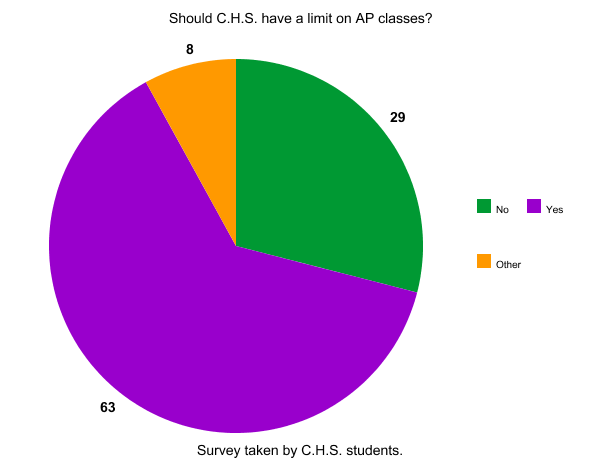Limiting AP Classes: Pros and Cons

C.H.S. students opinion on whether or not there should be a limit on AP classes.
February 6, 2019
There has been an ongoing debate in high school communities all across the country about whether or not schools should limit the number of Advanced Placement classes that students are allowed to take.
At C.H.S., there is not currently a limit on the number of AP classes available to students, meaning that some students can be taking up to 6 AP courses as early as sophomore year, and can be taking all AP’s as a junior and senior. However, some other schools in the area have limits on the number of APs that students can take each year, unlike C.H.S.
Currently, the PTO and the school board are discussing implementing a limit. If there were to be a limit put into place, it would have to pass through the school board and the superintendent’s office.
After talking to students and teachers at C.H.S., we looked at the pro’s and con’s of limiting the number of AP classes that students can take.
Pros of Limiting AP Classes
It has been shown that after taking 5 or 6 AP level classes over a student’s entire high school career, the benefits begin to plateau, the guidance department tells us. Students tend to be more stressed, learn less, and perform poorly. The curriculum simply becomes less advantageous.
“The research around how many AP classes students take nationally does show that there are a lot of negative impacts on students who take more than 4 or 5 AP classes, such as anxiety and stress levels,” said Dr. I. “High schools students need to feel like high school students without having the pressure of taking 7 APs.”
A major concern of students, parents, and teachers is the stress level of students who are taking so many AP classes. A complete AP workload is more than that of some college courses. If there were to be a limit to the number of APs available, students wouldn’t take so many difficult courses, might not experience as much stress, and have a more fulfilled high school experience. They would also have more time for other parts of their life, such as sports, clubs, and social activities.
“I think students would be happier,” said Ms. Williams. “I see students begin to crumble because they’re taking more classes than they should, on top of other obligations. The joy of learning is gone for them, and it takes away from the good, fun parts of high school. If the pressure is taken off, students begin to enjoy themselves.”
“Students should be having fun in high school, and that’s just not happening right now,” said Ms. Horne. “They should be having a life outside of school.”
Students are also currently constantly worrying about how their classes will look on their transcripts. Some people worry that if students are capped on how many AP’s they can take, they will look less desirable to colleges by not taking a full course load of APs. However, colleges look at how many AP’s a student is taking out of the number of APs offered, and judge the student by that.
“Right now, I have to indicate on college transcriptions that because we don’t offer a limit, students can be taking up to 30 AP classes over their entire high school career,” said Ms. Hart, the head of the C.H.S. counseling department.
“If there is a cap, and colleges know that, then they also know that you are, as a student, choosing to do the most rigorous work that you can. It eliminates the pressure that people feel comparing themselves to what other students are doing,” said Mr. Sohn.
In addition, college admissions often look at what AP classes students are taking to see what their interests are. Colleges want to see resumes that reflect someone’s interests, rather than someone’s strive to take the most rigorous and competitive number of classes to look on their transcript. If there were to be a limit for AP’s, students would be able to reflect their interests more to colleges than simply their ability to handle a higher level of academics. They might try to focus on the classes that they are really interested in to take at the AP level, and would also be more inclined to take certain electives that are appealing to them that they might avoid due to lack of AP credit.
“Limiting AP’s would provide structure for students to hone in on what they are really interested in. Right now, because we don’t have a limit, students are in a position to be academically competitive and take classes that don’t necessarily feel like strengths to them. If we were to limit we would give students the opportunity to be able to focus and specialize on their interests by taking challenging classes that appeal to them,” said Ms. Hart.
“Colleges want to see students taking a reasonable number of difficult courses, challenging themselves academically and doing well, but also doing sports, doing clubs, and having leadership in the community. That’s what colleges are looking for. Who are you? What are your interests? That’s what they want to know, that you can contribute to their community just as well as succeeding in the classes,” said Dr. I.
Students only being allowed to take a certain number of AP classes would also benefit the curriculum of those classes. All kinds of curriculum would be more rigorous if students are taking less APs, because teacher’s wouldn’t have to be so accommodating to the amount of difficult work some students are undertaking. Higher level students would be in lower-level classes, meaning the curriculum would have to fit their level of learning. Less AP classes would be offered and more honors, academic, and Dual Enrollment classes would be. More focus would be put on a stronger curriculum for these classes, making all classes better.
“Some of our classes might be able to be more rigorous. Right now, when there is no limit on the number of AP classes, the expectations in the classroom have to be adjusted in some way. There’s an opportunity for more academic depth with a limit,” said Ms. Hart.
“You would have higher level kids in non-AP classes, and you need to provide them with a challenge,” said Ms. Horne.
The classroom environment would also be enlightened because students taking AP classes would ideally be very interested in that subject and material, enjoying and putting in the work for that course, making the classrooms a richer experience. There would also be more students in grade-level classes and honors courses. Students wouldn’t be taking all of their classes with the same peers who are also seeking a certain number of APs, which would integrate students in the classroom and provide them with different experiences.
“I imagine most AP students take AP classes for the same reason: to look good to colleges, not for the content or structure of the classes themselves. Limiting the number of AP classes would allow for students to take a healthier, more balanced course load, improving their quality of life without negatively affecting their college admission chances,” said student Ned Derdeney (11).
Cons of Limiting AP Classes
The number of Advanced Placement classes students here at C.H.S. are permitted to take is a controversial topic in and around our school and many other schools in the United States. Currently there is a debate among the PTO and school board related to whether or not a limit on the number of AP courses would be beneficial to the mental health and general well being of students here at C.H.S.
Teachers, students and counselors had varied views and opinions on the idea of a change to the AP limit policy. As of right now, there is no limit to the number of AP’s students are allowed to take at C.H.S. leaving the decision up to students and parents themselves as to how many AP classes students can handle. This allows for students to take AP courses in all subject matters and delve into subjects that interest them the most.
AP Government teacher, Mr. Robinson said, “I don’t think there should be a mandatory limit, even though I think it’s a good thing for people to discuss and figure out what load is too much for them. I see some students who thrive on taking all classes at the highest level.” Many other teachers and students hold the same opinions, believing that an AP limit would be detrimental to their learning environment and would limit their ability to learn and excel in and out of the classroom. Mr. Robinson said he believes that if a limit were to be put into place, “Some students might find it reassuring not to have that pressure to take classes that would overburden them, and some would probably feel frustrated, they want to take something at the very highest level and have the richest level of discussion and advanced learning and can’t.”
This opinion sums up the general feelings of many, as for some students being able to take AP classes in high school shows them that they have the ability to study at a college level, encouraging them to further their education. Maya Block (11) says, “There should not be a limit on AP classes at C.H.S. because the school should not prohibit students from pushing themselves. The whole point of education is to grow so it doesn’t make sense for a school to put a limit on students growth.”
There are countless benefits to having all AP classes open for students at C.H.S. from a college standpoint, as succeeding in AP level courses in high school can not only save you money later on but can also save you time. Many colleges accept credits from AP courses if students earn a certain score on the exam at the end of the year, meaning that students are exempt from taking that class or a comparable class in college. This means they don’t have to pay for the cost of taking that particular class in college, and it also means that they have one less requirement to check off their list, meaning that they could potentially graduate early. The alternative to graduating early could be the ability to take more electives, study abroad more easily and in general have to ability to explore more courses that students may otherwise not be able to.
Another important factor in students ability to take AP courses is the skills learned in these college level classes. While there are many non-AP courses at C.H.S. that are highly challenging and teach students important study skills, AP courses often have different requirements as far as reading and writing throughout the year and many AP courses put more of an emphasis on students ability to gain the necessary information for the course through reading and researching independently which pushes students to gain study skills as well as organizational skills that do them well later in life. Another major factor that differentiates AP courses from non-AP courses is AP exams. These end of the year exams are extensive, many of which include multiple reading, writing and multiple choice sections as well as a free response section or short answer. These exams prepare students for the way in which their knowledge will be tested in college, but throughout the year students gain important skills and practices that will do them well in college and beyond. AP courses are pertinent for preparing many students at C.H.S. in college.




